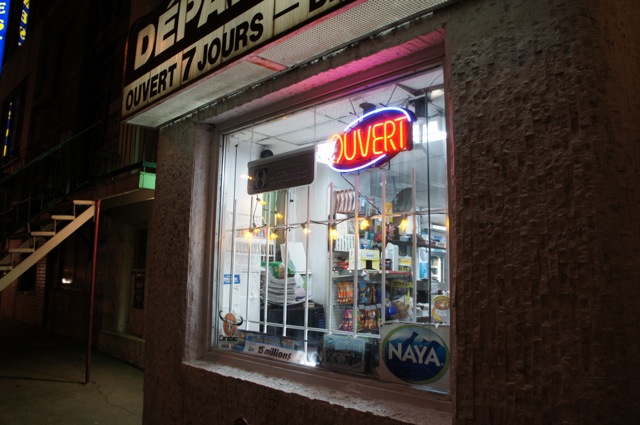
It transpires my brain only has a single language button. When 'off', I speak English and when 'on' I speak ... Foreign. For the majority of my life, 'Foreign' has corresponded to what French I managed to recall from school. Now --I discovered-- it produces Japanese. Given that I'm currently visiting Montreal, the largest city in the French-speaking Canadian province of Quebec, this is a trace unfortunate.
It is also rather surprising to the shop keepers who have been addressed in broken Japanese by a blond haired, blue eyed girl with a British accent.
Since the official languages of Canada are both English and French, it is the law that all government services must be conducted in both languages. In Ontario, this equates to everything being in English with the occasional nod to this rule in the form of a French stream in schools (largely taken up by English-speaking kids wishing to become bilingual), bilingual tourist information sheets and the odd sign post. In Montreal, it is totally different.
Shop fronts and road signs are in French, while the chatter on the streets is a mix of both languages, with French dominating over the English. Two of the city's major universities are split; the Université de Montreal operates predominantly in French while McGill University lectures in English. Wherever we travelled in the city, waiters and shop assistants greeted us first in French, before switching seamlessly into accented English.
Interestingly, Canadian French is substantially different from European French, although the latter is easily understood. The differences have been said to be greater than that between UK and USA English, but less than German and Swiss German. Somewhat ironically, Canadian French is closer to the early French language of the 15th - 17th century than European French, which has evolved away from the original pronunciations.
The reason for the francophone pocket of Canada is historical: In 1760, the French colony in Quebec was taken over by the British. This was about as popular as any visitor to Europe might expect and, in the resulting resistance, a compromise was reached with the 'Act of Quebec'. This recognised French Canadian distinctiveness and allowed them to keep their religion (Catholic), local laws and language.
This movement had an on/off success with the pressure for autonomy still present today in the form of the Quebec sovereignty movement. Supporters of Quebec's independence claim that the province's best interests cannot be recognised in the predominantly anglophone Canada. Associated with this is the concern that the French language will become overwhelmed, taking a major part of Quebec's identity and heritage with it. This has led to claims of discrimination against Anglo-Quebecers with the terms 'pure laine' (pure wool) used to denote Quebec residents of French descent.
After the initial excitement of "Wow! That sounds just like Harry Potter!" had worn off, I was a little concerned about our reception in Montreal. Would we have to manage with our limited French for fear of mortally offending the entire province every time we ordered a cup of tea? Would English be understood, but only with a particularly bad grace? Or would we be declared 'mudbloods' and banned from Hogwarts forever?!
It turned out we need not have worried. Montreal is a very friendly city and everyone I have met has been happy to converse in either French or English. Of course... this might have been born out of relief that I was no longer attempting to ask the location of the toilet in Japanese.